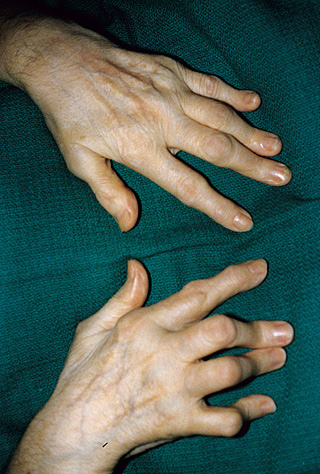Boutonniere Deformity
What is Boutonniere Deformity?
Boutonniere Deformity refers to the abnormal position of a finger in which the middle knuckle is bent downwards and the knuckle at the tip is bent upwards.
Symptoms of Boutonniere Deformity
The condition causes a noticeable visual deformity of the finger. There is usually associated stiffness and decreased motion of the finger. Pain is less common.
Common Causes of Boutonniere Deformity
The underlying cause of the deformity is damage to the main extensor tendon attached to the top of the finger’s middle bone. After this tendon injury the middle knuckle can no longer be extended and it becomes bent downward. Over time, other small tendons that run along the top of the finger – the lateral bands – subluxate downwards, which further contributes to bending of the middle knuckle. These intact lateral bands also lead to unopposed extension of the tip of the finger. This Boutonniere Deformity can result from a blow, deep cut, or the effects of Rheumatoid Arthritis. The injury is often seen in basketball and volleyball players.
Diagnosing Boutonniere Deformity
A careful physical exam using certain special maneuvers will identify the deformity. Understanding how the injury has occurred, whether due to a recent traumatic event or a long-standing inflammatory disorder, is also essential. An x-ray is obtained to evaluate the condition of the joints in the finger, since joint inflammation and degeneration can be the underlying culprit.
Treatment Options for Boutonniere Deformity
Acute and simple cases with flexible joints can be treated with splinting for 4-6 weeks and stretching exercises. In cases of fractures, severe lacerations, or advanced rheumatoid arthritis, surgery may be indicated to repair the injured tendon or reconstruct the joint.
Conclusion
Boutonniere Deformity may be functionally disabling for your finger. Call New York City Hand Surgeon Dr. Pruzansky at 212-249-8700 to schedule an appointment and regain a straighter, more functional finger.



